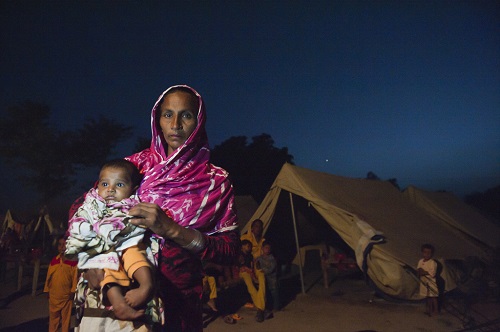ADB photo
By
Muhammad Shoaib Khan
The global trend towards smaller families is a reflection of people making reproductive choices to have as few or as many children as they want, and when they want. Once people lack choice, it can have a long-term impact on fertility rates, often making them higher or lower than what most people desire, according to The State of World Population 2018, published by UNFPA, the United Nations sexual and reproductive health agency.
Pakistan is the fifth most populous country in the world with 208 million people and a population growth rate of 2.4% per year. The growing population is likely to outstrip developmental gains, and continue to adversely affect the economy, environment, health, education and quality of the lives of all citizens.
Family size is closely linked with reproductive rights, which, in turn, are tied to many other rights, including the right to health care, education, and jobs. Where people can exercise their rights, they tend to thrive. Where these rights are stifled, people often fail to achieve their full potential, impeding economic and social progress, according to the new report, entitled, “The Power of Choice: Reproductive Rights and the Demographic Transition.”
“Choice can change the world,” UNFPA Executive Director Dr. Natalia Kanem writes in the report’s foreword. “It can rapidly improve the well-being of women and girls, transform families, and accelerate global development.”
When a woman has the power and means to prevent or delay a pregnancy, for example, she has more control over her health and can enter or stay in the paid labor force and realize her full economic potential.
Dr. Hassan Mohtashami, UNFPA, Representative in Pakistan, stated “choices can change the world. The power to choose the number, timing and spacing of pregnancies will bolster economic and social progress around the world for decades to come. The unmet need for modern contraception prevents thousands of families from choosing their desired family size and perusing their dreams and aspirations.” He further added that every year the report is published on different social issues. Now the fertility rate is decreasing day by day in women. Furthermore he said that the death rate of women during pregnancy in Pakistan is 1:140, which is an alarming situation. This can only be prevented by measures taken like family planning and mid-wife trained individuals. On a question related to role of academia he added that we can’t recommend plans to couples but the issue can be addressed through controlled environment in schools.
Mr. Pervaiz Ahmed Junejo, Executive Director, NIPS stated “The Pakistan Demographic and Health Survey (PDHS) key indicators report shows that the current Total Fertility Rate (TFR) at 3.6 is considerably high compare to the countries in the region except Afghanistan.”
The global report found that no country can claim that all of its citizens enjoy reproductive rights at all times. Most couples cannot have the number of children they desire to have because they either lack economic and social support to achieve their preferred family size, or don’t have the means to control their fertility. The unmet need for modern contraception prevents millions of women from choosing smaller families.
Since the 1994 International Conference on Population and Development, reproductive health and rights have substantially improved around the world. People have more information about their reproductive rights and choices, and a greater capacity to claim their rights. “The historic transition to lower fertility,” says the report, “has emerged through people claiming their right to make choices about their reproductive lives, and to have as few, or as many, children as they want, when they want.”
The report classifies all countries in the world by the current dynamics of their populations’ fertility. It makes specific recommendations for policies and programmes that would help each country increase reproductive choices.
To make freedom of choice a reality, says the report, countries can prioritize universal access to quality reproductive health care, including modern contraceptives; ensure better education, including age-appropriate and culturally-sensitive sexuality education; advocate for a change in men’s attitudes to be supportive of the rights and aspirations of women and girls; and make it easier for couples to have more children, if they want them, by enabling greater work-life balance through measures such as affordable child care.
“The way forward is the full realization of reproductive rights, for every individual and couple, no matter where or how they live, or how much they earn,” says the Dr. Kanem. “This includes dismantling all the barriers—whether economic, social or institutional—that inhibit free and informed choice.”
Muhammad Shoaib Khan
Muhammad Shoaib Khan is a journalist from Pakistan and has worked with NEO TV, Independent News, PBCand The Nation.



No Comments Yet!
You can be first to comment this post!